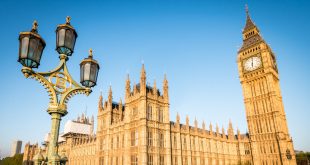Industry strategic consultancy Regulus Partners examines a week full of regulatory warnings in the Netherlands, further political disruption in the UK, and gaming reform in Ireland.
Netherlands: online regulation – orange warning signals?
The implementation of the Netherlands Remote Gaming Act faced more parliamentary scrutiny this week, with a theme of questioning from the Justice and Security Committee being ensuring tough protections and controls and the re-opening of the controversial two-year ‘cooling off’ period. While the broad tenor of the debate would suggest continued progress to implementation (with parties controlling c. two thirds of the lower house indicating support), there are a few important warning signals to consider, in our view.
The most obvious point to make is that the Netherlands is likely to expect its regulator to be robust and disciplined in order to maintain the coalition of political support for a broadly liberal and permissive approach to online gambling. All the indications are that this is what the Kansspelautoriteit will provide and there have been some refreshingly clear guidelines to let potential operators know where they stand (learning the lessons of nearly every other jurisdiction as well as applying a suitably methodical domestic approach).
However, operators used to a bit of latitude (and there aren’t many of those anymore) or hoping to muddle into compliance after getting a licence are likely to find themselves subjected to some very tough sanctions: the Netherlands, more than many other licensing jurisdictions is likely to test ‘operational compliance’ (every key person knows their obligations and operates within them) vs. ‘process compliance’ (boxes are ticked by a siloed department) to its limit.
Ironically, given the political backdrop, signs of the regulator doing its job post licensing (public fines etc) is likely to increase pressure for tougher legislation (advertising restrictions, further product restrictions etc – it should be noted that many exotic in-play bets will already be restricted). The political debate demonstrates that operators need to behave impeccably to preserve their operating freedoms: the Netherlands opening needs to demonstrate that there is a first time for everything.
The second thorny issue is the cooling off period. Most fined operators (most of the current Netherlands .com market by revenue) seem to be hoping that the six months delay to licensing brings them closer to a level playing field. We would be concerned that Dutch politicians in favour of the cooling off period (which seems to be most) would see this as undermining the spirit of the law – there is little inherent punishment in a licensing gap of a few months if at all, if it is accepted that stopping targeted .com activities is merely following the law and not a punishment (however costly they may be).
There is a strong likelihood therefore, in our view, that the cooling off period will be adjusted to ensure that operators which haven’t targeted Dutch players (including domestic landbased operators) get at least 6 months of market access ahead of fined .com operators.
The argument used against this is that channelling (a key KPI of domestic regulatory success, fully recognised by the Dutch authorities) will be impacted – an argument we have heard a lot. We are less sure in this instance, especially given materially exposed .com operators will almost certainly want a licence later and so will play ball (their customers will therefore need to find new supply: disruption is built in vs. a smooth grey to dark grey / black market status quo).
There is of course a much bigger risk to a permanent black out, which could be challenged and therefore potentially ignored, but we doubt this is on the cards. Channelling should be considered by product group and matched to the quality of potential licensed supply. First, the Netherlands has a number of credible landbased gaming companies that can go live with a strong offer straight away (e.g. Holland Casino, JVH, Jansen Hanraths, Hommerson) – casino can probably be pretty well catered for and is likely to represent c. 60% of revenue.
These operators will also likely have an adequate sportsbook for go-live, which if supplemented by bet365 (which has not been ‘targeting’ Dutch customers and hasn’t been fined) and one or two other credible operators with no issues (say Betway, BetVictor), would give the market plenty of effective choice (while whoever is on a Kambi platform will be able to offer a pretty good rendition of erstwhile .com market-favourite Unibet) – betting can also be well catered for.
Poker is a more obvious problem, with most markets that miss Stars missing a viable market. However, France’s Winamax now has enviable Western European liquidity and could go a long way to plug the hole, as could 888 – the poker market might shrink without Stars, but it would unlikely go ‘black’ given the lack of readily available choice (so there is a revenue impact, but not a channelling one).
The essential issue is that heavy users are promiscuous while the Netherlands barely has an online mass market (thanks to the increasingly enforced restrictions and the lack of domestic supply). Heavy users will therefore find regulated supply so long as the product is good enough (there are issues with in-play around the edges here, but broadly it will be: and the in-play issues have nothing to do with the cooling off period).
We therefore expect the Netherlands to be relatively open from a product perspective, workable from a tax perspective, with attractive underlying scale and growth drivers (heavy user channelling, mass market adoption). However, current market share could be shaken up aggressively while the cost of compliance failure is likely to be very high. There is a lot for many remote operators to dislike in this, but the alternatives of light touch licensing or sever restrictions are not workable options and/or represent an even worse outcome for (most) operators.
The Netherlands approach is therefore likely to be tough on .com operators but commercially viable responsibly developed operations – pain and opportunity are therefore relatively evenly matched in an approach that might increasingly become a blueprint for pragmatic compromise, in our view.
Great Britain: Out of Parliament – Health alert as Tories set out 2020 vision
Britain’s regulated gambling industry can spend the next few weeks trying to work out which General Election result is likely to be the lesser of ‘evils’ after Boris Johnson’s Conservative Party double-dipped on gambling legislative reform this week.
Yesterday, the Health Secretary, Matt Hancock (Cons, West Suffolk) announced plans to institute “an independent review…into the 2005 Gambling Act to update it for the modern digital age”. This followed the publication on Sunday of the party’s manifesto which had also included a commitment to reassess legislation.
The review body will be asked to make recommendations on stake and prize limits (presumably online but who knows where this might go); the “misuse of credit card payments”; “putting the voluntary levy on a statutory footing”; and looking at “new ways of raising revenue for problem gambling support” (which presumably is code for further tax raids on a creaking industry).
So far, so very Tom Watson. However, the true significance of yesterday’s announcement was not so much what was said but who said it. The prospect of the Department of Health setting out plans to review Britain’s gambling legislation (rather than simply examining gambling-related harm) should send a shiver down the spine of every gambling executive in the country.
As we have written before, the movement to relocate policy from the Department for Culture, Media and Sport to the Department of Health and Social Care is part of a prohibitionist agenda to position gambling as “the new tobacco” – as an inherently harmful vice (and future Health Secretaries might be less prone to be sympathetic to at least some forms of gambling than the MP for West Suffolk).
In 2018, the Labour Party instituted a Shadow Culture and Shadow Health review of gambling in Great Britain – but it was always clear that Health was the junior partner in the scheme. Yesterday’s announcement from the Conservatives did not even make passing reference to the DCMS. This ought to be a source of concern. The continual changes of ministerial personnel at the department have contributed to a catastrophic lack of leadership on gambling matters; but throughout this, the policy team has managed to maintain a sense of proportion. Its measured tone and common sense approach has contrasted creditably with increasingly shrill voices elsewhere in the regulatory-political firmament.
Yesterday’s announcement also appears to pose questions about the Government’s faith in the Gambling Commission. This year, the regulator has commenced formal reviews of both gambling on credit cards and funding mechanisms for research, education and treatment – both of which now look likely to be superseded by the Department of Health’s decision to take matters into hand. These reviews will still be important in terms of influencing outcomes, but they no longer appear to be decisive (and we should recall that last year the Commission was effectively over-ruled on FOBT stake reduction).
As we have written before, a properly coordinated, suitably rigorous and properly independent legislative reassessment may be preferable to the hotch-potch of (sometimes knee-jerk) micro-reviews currently taking place. While many within the industry will perceive this as a threat, it is imperative that licensees engage constructively with whatever process is instituted by the next Government (whether Labour or Tory led). It presents a once in a generation opportunity to reboot the regulatory system – and it need not be exclusively reductive.
It will take some time for the formal process of legislative re-examination to begin; but this does not mean that the industry has time on its side. Any Government review will be informed and influenced by the large number of reformist projects already in train, including the House of Lords select committee inquiry into the social and economic effects of gambling; the Gambling-related Harm All Party Parliamentary Group’s inquiry on remote gambling; the Howard League for Penal Reform’s committee on gambling-related crime; Public Health England’s evidence review of gambling harm; Lord Chadlington’s assessment of how to disburse £60m of research, education and treatment funding; multiple Gambling Commission consultations; and a wide range of research projects covering such topics as gambling disorder and domestic violence, treatment effectiveness and self-exclusion schemes. This represents a wide expanse of regulatory-political territory to cover for an industry that has struggled to cope with lesser challenges in the past. It is also an indication of how tricky it is likely to be to distil sound policy in an increasingly noisy debate.
Elsewhere, the Scottish Nationalist Party has joined in the fun by calling (once again) for greater devolution of gambling legislation and for a “full public health inquiry into gambling-related harm.”
Finally, while the former Deputy Leader of the Labour Party Tom Watson may have called it quits on politics (for now), he demonstrated this week that he scrutiny on the gambling industry is as sharp as ever. On Sunday, Watson helped judge the National Game’s annual ‘Bingo Caller of the Year’ contest. The 2019 title was awarded to Donna Kunyo from Brian Fraser’s Club 3000 in Middleton (Greater Manchester) who sang the Shirley Bassey standard, ‘This is My Life’.
Ireland: Regulation – Irish slots take five
The Irish government this week announced that slot machine stakes would be capped at €5 a spin with jackpots restricted to €500 under new legislation. Notionally, this represents a substantial increase from current (ancient and irrelevant) levels (€0.03 and €0.50), but in reality slot machines have long been available to play at higher levels across a wide number of unregulated, unlicensed venues (effectively meaning that the Irish Treasury only benefits directly from gamers via its €405m sale of the lottery in 2014, c. €226m in annual lottery good cause distribution, and – accidentally – VAT from online gaming; betting now provides a small surplus after duty was doubled – prior to that the tax payer was subsidising the horse and dog racing industries since betting duty receipts covered only 82% of the subsidy cost, even after capturing online).
Over the last dozen years, Ireland has provided a masterclass in how to get gaming reform wrong. The country has had (and still has) much bigger issues to deal with but it is difficult to make excuses for what has been a painfully slow and inept process to updating primary legislation that is now more than 60 years old. If – as both Labour and now the Conservatives maintain – Britain’s Gambling Act 2005 is “analogue legislation in a digital age”, then Ireland’s is positively prehistoric.
Europe: regulation – save the whales
Somewhere along the line, ‘VIP’ appears to have become a dirty term in gambling. In most consumer industries, ‘VIP’ is an aspirational acronym, indicating elevated levels of service and customer care as well as expenditure. While some remote operators have understood this, far too many have defined VIP programmes almost exclusively in terms of revenue extraction (often betrayed by the use of negative jargon, such as ‘lifetime value’).
This week, Paddy Power was criticised in the Daily Mail over allegations that it had used its VIP programme for unethical purposes. Concern over the operation of such schemes has been highlighted by the House of Lords select committee inquiry, the Gambling-related Harm All Party Parliamentary Group and the Gambling Commission. Meanwhile, in Spain, the Directorate General for the Regulation of Gambling appeared to suggest (quite reasonably) that formerly self-excluded customers should not be permitted to become VIPs.
This is all rather a shame. There is nothing wrong with treating higher value customers differently from others – at least not unless one lives in a Marxist state. In this context is it worth considering that the top 1% of income tax payers account for 39% of receipts in the US and 28% in the UK: if gambling operators saw revenue concentrations materially lower than this (benchmarked by jurisdiction), then it would suggest they are not tapping into the market arguably best able to safely engage (little danger of gambling the rent or food money).
It is how this is done that matters: the challenge for the remote industry is to reframe ‘VIP’ status so that it becomes associated with heightened customer affordability, safety and well-being rather than simply a reflection of an individual’s capacity to lose money, whether they have it to lose or not. Otherwise, a critical and (when well run) entirely legitimate revenue segment will be lost.
__________
Content provided by Regulus Partners










